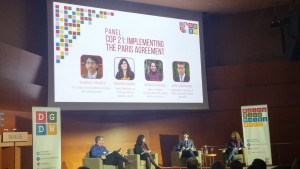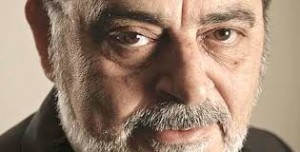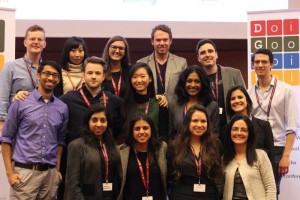For the last 13 years, IESE students have been organising a conference called Doing Good Doing Well in which they invite speakers from around the world to talk about issues that have to do with environmental sustainability, corporate social responsibility, and other subjects which fall within the idea of responsible business.

It is always a pleasure to see the students commitment and fascinating to watch how the theme of the conference changes from year to year as a function of current events and the student’s ideas about what is important and where they want to put their energy. One presentation in this edition, for example, was about Solvay’s support for the around the world solar plane project, Solar Impulse 2. Others discussed the Stockholm Resilience Center’s idea of 9 boundaries for the planet.
Big Oil ?
An interesting thing about this year’s conference is that a leading oil company did not renew its sponsorship. While I understand that some people were pleased by their absence, I think the conference benefited in the past from the tension their presence created, which was the subject of a blog post in this space last year.
Part of that disagreement is the pace at which people believe that the current energy infrastructure can be changed to a lower carbon footprint or even made to be carbon neutral. Oil majors generally believe that such change will take many decades and thus believe that their role is fundamental. Others support the idea that much of the world’s oil, gas, and coal resources need to be left in the ground if we have any chance of meeting the 2 degree target agreed upon in Paris.
Laudato Si
Another new aspect of the conference was a terrific session moderated by IESE’s Dr. Mele and led by Jose Ignacio García, who tweets under the hashtag ECOJESUIT and went through his understanding of Pope Francis‘ second encyclical. The document was summarized in an earlier post but is worth reading in its entirety and can be found here.
 Implementing Cop 21
Implementing Cop 21
I was asked to run a panel on the Paris agreement which was also discussed by other speakers such as Etopia’s Michel Genet. The questions discussed were the meaning of the Paris accord, concerns about its non-binding nature, and challenges facing its implementation. In summary the panel discussed the following ideas:
- The Paris agreement is historic despite the fact that it does not go far enough to solve the climate challenge by itself. As has been discussed in earlier posts, COP 21 sets the institutional framework for solving the problem, establishes a clear pathway, but also postpones some of the difficult issues to the future.
- The agreement is non-binding as that was a necessary condition to get the U.S. , China, and India to agree and without those three countries, the agreement would not be so compelling.
- While the current oil price and political situation in a particular country such as the U.S. might impact aspects of the agreement in the short term, civil society expects progress and over the long term, the panel thought that the world would move in the right direction.
Make It Personal

The conference ended with a terrific speech by George Koukis, an entrepreneur and founder of A Dream for the World who encouraged the participants, mainly MBA students to dream big and maximize their return on integrity by building sustainable business over the long term.


